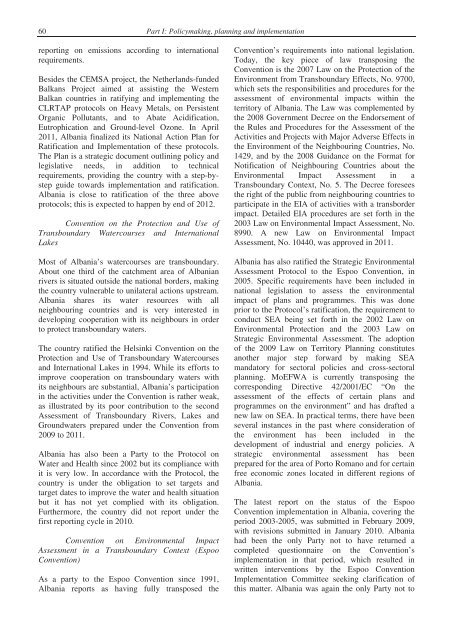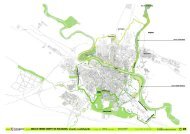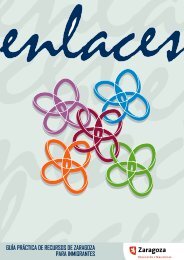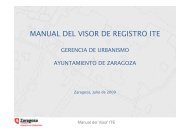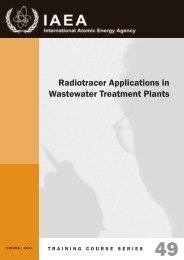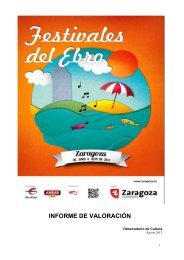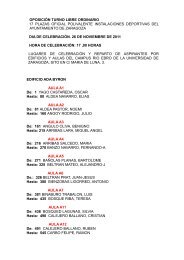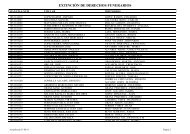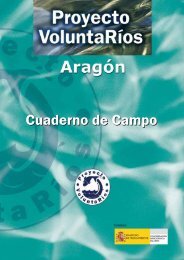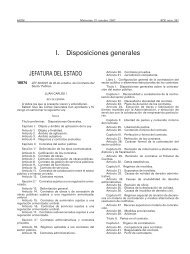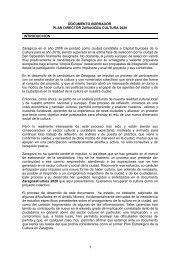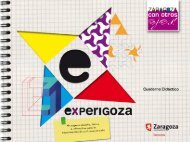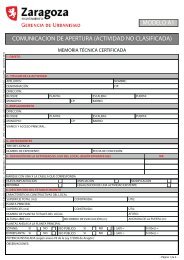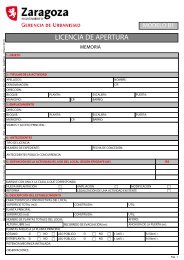Chapter 4: Implementation <strong>of</strong> international agreements and commitments59Box 4.1: Coastal zone management plansThe World Bank has financed coastal zone management plans for the northern and southern coastal regions, which arecomplementary with the UNEP/Mediterranean Action Plan (MAP) Coastal Area Management Programme (CAMP) for<strong>Albania</strong>. The World Bank is also implementing the Integrated Coastal Zone Management and Clean-Up Programme, themain goal <strong>of</strong> which is to protect <strong>Albania</strong>n coastal ecosystems, resources and cultural assets and to promote theirsustainable development and management. The Southern Coastal Development Plan and Regulations prepared under theproject were approved in the National Council for Territorial Adjustment in July 2008. Preparation <strong>of</strong> the plan is coupled withcommunity-based investments, from which the first round <strong>of</strong> coastal village infrastructure investments is underway, includingroads, sewerage facilities and cultural enhancement infrastructure. In addition, the World Bank has been implementing aGEF-financed project for Integrated Water and Ecosystem Management (US$ 5 million) which twinned with the EuropeanInvestment Bank to support the development <strong>of</strong> three large sewerage treatment plants in coastal areas. The project closedwith an unsatisfactory rating in December 2009, and the plants have yet to be completed owing to delays in Governmentcounterpart financing.<strong>Albania</strong> participates in the UNEP/MAP–GEF MedPartnership (Strategic Partnership for the Mediterranean Large MarineEcosystem). The MedPartnership works through two lines <strong>of</strong> action: technical and policy support led by UNEP/MAP(Regional Project), and project financing led by the World Bank (Investment Fund/Sustainable Mediterranean Programme).The project is being implemented in close association with other relevant regional initiatives, such as the Horizon 2020Initiative to depollute the Mediterranean, and the Integrated European Maritime Policy.In line with these international obligations, the NSDIrequires the country to protect the maritimeenvironment through joint activities with theRegional Marine Pollution Emergency ResponseCentre for the Mediterranean Sea (REMPEC) inMalta. The Sector Strategy <strong>of</strong> Transport for theperiod 2008-2013 stresses the need to protect themarine environment and coastal zones, and placesemphasis on enforcement <strong>of</strong> the MARPOL 73/78Convention. In addition, a number <strong>of</strong> pieces <strong>of</strong>legislation were amended in the period 2007-2009 inorder to align national legislation with EU Regulation1967/2006/EC concerning management measures forthe sustainable exploitation <strong>of</strong> fishery resources inthe Mediterranean Sea. There are no specificmaritime agreements signed with neighbouringcountries regarding fishing.Several government agencies are involved in theimplementation <strong>of</strong> marine MEAs. MoEFWA ensuresthe inspection and protection <strong>of</strong> marine waters. The<strong>Albania</strong>n Coast Guard is also an important player;pursuant to Article 5 <strong>of</strong> the 2002 Law on the CoastGuard it has the task “... <strong>of</strong> protecting the marineenvironment ... [and] to enforce legislation onpollution in the coastal and marine environment”.Another body involved in the management <strong>of</strong> marinewaters and coastal zones is MoPWTT.4.5 UNECE multilateral environmentalagreementsConvention on Long-range TransboundaryAir Pollution<strong>Albania</strong> ratified CLRTAP in 2005 and, since 2009,has ratified four <strong>of</strong> its eight protocols: the firstSulphur Protocol, the NOx Protocol, the secondSulphur Protocol and the Co-operative Programmefor Monitoring and Evaluation <strong>of</strong> the Long-rangeTransmission <strong>of</strong> Air Pollutants in Europe (EMEP)Protocol. The draft law on air protection, which is toreplace the 2002 Law on Protection <strong>of</strong> Air fromPollution, transposes parts <strong>of</strong> EU measures related toair protection, specifically provisions <strong>of</strong> the Directive2008/50/EC on ambient air quality and cleaner air forEurope, including new air quality objectives for fineparticles that are in line with the Gothenburg Protocol<strong>of</strong> CLRTAP.MoEFWA is responsible for preparing inventories <strong>of</strong>pollutant emissions into the atmosphere from allactivities for the purpose <strong>of</strong> implementing legalobligations. A partial inventory <strong>of</strong> gas emissions for2004 was prepared within the StEMA project,according to the CORINAIR methodology and theSelected Nomenclature on Atmospheric Pollutants.The project did not succeed, however, in buildingsufficient capacity within MoEFWA and currentlythere is no qualified domestic expert team to updateand follow up on the inventory prepared by StEMA.Thanks to support from the Italian Government, in2011 an emission inventory was compiled for theyear 2008 and available air emission data weresubmitted to EMEP. Funds for another inventory arealso secured. The ongoing IPA Consolidation <strong>of</strong> the<strong>Environmental</strong> Monitoring System in <strong>Albania</strong>(CEMSA) project, which is assisting MoEFWA inbuilding an operational Integrated <strong>Environmental</strong>Monitoring System (IEMS), would build sufficientcapacity. One <strong>of</strong> the expected project outputs will bethe establishment <strong>of</strong> an environmental database withquality-assured information produced by monitoringand inventories <strong>of</strong> major environmentalcompartments which, in turn, would facilitate regular
60 Part I: Policymaking, planning and implementationreporting on emissions according to internationalrequirements.Besides the CEMSA project, the Netherlands-fundedBalkans Project aimed at assisting the WesternBalkan countries in ratifying and implementing theCLRTAP protocols on Heavy Metals, on PersistentOrganic Pollutants, and to Abate Acidification,Eutrophication and Ground-level Ozone. In April2011, <strong>Albania</strong> finalized its National Action Plan forRatification and Implementation <strong>of</strong> these protocols.The Plan is a strategic document outlining policy andlegislative needs, in addition to technicalrequirements, providing the country with a step-bystepguide towards implementation and ratification.<strong>Albania</strong> is close to ratification <strong>of</strong> the three aboveprotocols; this is expected to happen by end <strong>of</strong> 2012.Convention on the Protection and Use <strong>of</strong>Transboundary Watercourses and InternationalLakesMost <strong>of</strong> <strong>Albania</strong>’s watercourses are transboundary.About one third <strong>of</strong> the catchment area <strong>of</strong> <strong>Albania</strong>nrivers is situated outside the national borders, makingthe country vulnerable to unilateral actions upstream.<strong>Albania</strong> shares its water resources with allneighbouring countries and is very interested indeveloping cooperation with its neighbours in orderto protect transboundary waters.The country ratified the Helsinki Convention on theProtection and Use <strong>of</strong> Transboundary Watercoursesand International Lakes in 1994. While its efforts toimprove cooperation on transboundary waters withits neighbours are substantial, <strong>Albania</strong>’s participationin the activities under the Convention is rather weak,as illustrated by its poor contribution to the secondAssessment <strong>of</strong> Transboundary Rivers, Lakes andGroundwaters prepared under the Convention from2009 to 2011.<strong>Albania</strong> has also been a Party to the Protocol onWater and Health since 2002 but its compliance withit is very low. In accordance with the Protocol, thecountry is under the obligation to set targets andtarget dates to improve the water and health situationbut it has not yet complied with its obligation.Furthermore, the country did not report under thefirst reporting cycle in 2010.Convention on <strong>Environmental</strong> ImpactAssessment in a Transboundary Context (EspooConvention)As a party to the Espoo Convention since 1991,<strong>Albania</strong> reports as having fully transposed theConvention’s requirements into national legislation.Today, the key piece <strong>of</strong> law transposing theConvention is the 2007 Law on the Protection <strong>of</strong> theEnvironment from Transboundary Effects, No. 9700,which sets the responsibilities and procedures for theassessment <strong>of</strong> environmental impacts within theterritory <strong>of</strong> <strong>Albania</strong>. The Law was complemented bythe 2008 Government Decree on the Endorsement <strong>of</strong>the Rules and Procedures for the Assessment <strong>of</strong> theActivities and Projects with Major Adverse Effects inthe Environment <strong>of</strong> the Neighbouring Countries, No.1429, and by the 2008 Guidance on the Format forNotification <strong>of</strong> Neighbouring Countries about the<strong>Environmental</strong> Impact Assessment in aTransboundary Context, No. 5. The Decree foreseesthe right <strong>of</strong> the public from neighbouring countries toparticipate in the EIA <strong>of</strong> activities with a transborderimpact. Detailed EIA procedures are set forth in the2003 Law on <strong>Environmental</strong> Impact Assessment, No.8990. A new Law on <strong>Environmental</strong> ImpactAssessment, No. 10440, was approved in 2011.<strong>Albania</strong> has also ratified the Strategic <strong>Environmental</strong>Assessment Protocol to the Espoo Convention, in2005. Specific requirements have been included innational legislation to assess the environmentalimpact <strong>of</strong> plans and programmes. This was doneprior to the Protocol’s ratification, the requirement toconduct SEA being set forth in the 2002 Law on<strong>Environmental</strong> Protection and the 2003 Law onStrategic <strong>Environmental</strong> Assessment. The adoption<strong>of</strong> the 2009 Law on Territory Planning constitutesanother major step forward by making SEAmandatory for sectoral policies and cross-sectoralplanning. MoEFWA is currently transposing thecorresponding Directive 42/2001/EC “On theassessment <strong>of</strong> the effects <strong>of</strong> certain plans andprogrammes on the environment” and has drafted anew law on SEA. In practical terms, there have beenseveral instances in the past where consideration <strong>of</strong>the environment has been included in thedevelopment <strong>of</strong> industrial and energy policies. Astrategic environmental assessment has beenprepared for the area <strong>of</strong> Porto Romano and for certainfree economic zones located in different regions <strong>of</strong><strong>Albania</strong>.The latest report on the status <strong>of</strong> the EspooConvention implementation in <strong>Albania</strong>, covering theperiod 2003-2005, was submitted in February 2009,with revisions submitted in January 2010. <strong>Albania</strong>had been the only Party not to have returned acompleted questionnaire on the Convention’simplementation in that period, which resulted inwritten interventions by the Espoo ConventionImplementation Committee seeking clarification <strong>of</strong>this matter. <strong>Albania</strong> was again the only Party not to
- Page 1 and 2:
UNITED NATIONS ECONOMIC COMMISSION
- Page 6 and 7:
vPrefaceThe second EPR of Albania b
- Page 8 and 9:
viiLIST OF TEAM MEMBERSMr. Antoine
- Page 10 and 11:
ixMinistry of Agriculture, Food and
- Page 12 and 13:
xiCONTENTSForeword ................
- Page 14 and 15:
8.3 Biological diversity ..........
- Page 16 and 17:
xvPageChapter 8Table 8.1:Table 8.2:
- Page 18 and 19:
xviiPageLIST OF PHOTOSIntroductionP
- Page 20 and 21:
xixLIST OF ABBREVIATIONSAICASCICANP
- Page 22 and 23:
xxiSIGNS AND MEASURES .. not availa
- Page 24 and 25:
xxiiiExecutive summaryThe first Env
- Page 26 and 27:
The entire education system is subj
- Page 28 and 29:
was done by international consultan
- Page 30 and 31:
1Introduction I.1 Physical contextA
- Page 32 and 33:
Introduction3The country has deposi
- Page 34 and 35:
Introduction5Photo I.1: Ruins of Sk
- Page 36:
PART I: POLICYMAKING, PLANNING AND
- Page 39 and 40: 10 Part I: Policymaking, planning a
- Page 41 and 42: 12 Part I: Policymaking, planning a
- Page 43 and 44: 14 Part I: Policymaking, planning a
- Page 45 and 46: 16 Part I: Policymaking, planning a
- Page 47 and 48: 18 Part I: Policymaking, planning a
- Page 49 and 50: 20 Part I: Policymaking, planning a
- Page 51 and 52: 22 Part I: Policymaking, planning a
- Page 53 and 54: 24 Part I: Policymaking, planning a
- Page 55 and 56: 26 Part I: Policymaking, planning a
- Page 57 and 58: 28 Part I: Policymaking, planning a
- Page 59 and 60: 30 Part I: Policymaking, planning a
- Page 61 and 62: 32 Part I: Policymaking, planning a
- Page 63 and 64: 34 Part I: Policymaking, planning a
- Page 65 and 66: 36 Part I: Policymaking, planning a
- Page 67 and 68: 38 Part I: Policymaking, planning a
- Page 69 and 70: 40 Part I: Policymaking, planning a
- Page 71 and 72: 42 Part I: Policymaking, planning a
- Page 73 and 74: 44 Part I: Policymaking, planning a
- Page 75 and 76: 46 Part I: Policymaking, planning a
- Page 77 and 78: 48 Part I: Policymaking, planning a
- Page 79 and 80: 50 Part I: Policymaking, planning a
- Page 81 and 82: 52 Part I: Policymaking, planning a
- Page 83 and 84: 54 Part I: Policymaking, planning a
- Page 85 and 86: 56 Part I: Policymaking, planning a
- Page 87: 58 Part I: Policymaking, planning a
- Page 91 and 92: 62 Part I: Policymaking, planning a
- Page 93 and 94: 64 Part I: Policymaking, planning a
- Page 96 and 97: 67Chapter 5ECONOMIC INSTRUMENTS AND
- Page 98 and 99: Chapter 5: Economic instruments and
- Page 100 and 101: Chapter 5: Economic instruments and
- Page 102 and 103: Chapter 5: Economic instruments and
- Page 104 and 105: Chapter 5: Economic instruments and
- Page 106 and 107: Chapter 5: Economic instruments and
- Page 108: PART III: INTEGRATION OF ENVIRONMEN
- Page 111 and 112: 82 Part III: Integration of environ
- Page 113 and 114: 84 Part III: Integration of environ
- Page 115 and 116: 86 Part III: Integration of environ
- Page 117 and 118: 88 Part III: Integration of environ
- Page 119 and 120: 90 Part III: Integration of environ
- Page 121 and 122: 92 Part III: Integration of environ
- Page 124 and 125: 95Chapter 7WASTE MANAGEMENT7.1 Intr
- Page 126 and 127: Chapter 7: Waste management97sold f
- Page 128 and 129: Chapter 7: Waste management99SitesC
- Page 130 and 131: Chapter 7: Waste management101Table
- Page 132 and 133: Chapter 7: Waste management103• C
- Page 134 and 135: Chapter 7: Waste management105sever
- Page 136: Chapter 7: Waste management107(b) E
- Page 139 and 140:
110 Part III: Integration of enviro
- Page 141 and 142:
112 Part III: Integration of enviro
- Page 143 and 144:
114 Part III: Integration of enviro
- Page 145 and 146:
116 Part III: Integration of enviro
- Page 147 and 148:
118 Part III: Integration of enviro
- Page 149 and 150:
120 Part III: Integration of enviro
- Page 151 and 152:
122 Part III: Integration of enviro
- Page 153 and 154:
124 Part III: Integration of enviro
- Page 155 and 156:
126 Part III: Integration of enviro
- Page 157 and 158:
128 Part III: Integration of enviro
- Page 159 and 160:
130 Part III: Integration of enviro
- Page 161 and 162:
132 Part III: Integration of enviro
- Page 164 and 165:
135Chapter 10HUMAN HEALTH AND ENVIR
- Page 166 and 167:
Chapter 10: Human health and enviro
- Page 168 and 169:
Chapter 10: Human health and enviro
- Page 170 and 171:
Chapter 10: Human health and enviro
- Page 172 and 173:
Chapter 10: Human health and enviro
- Page 174 and 175:
Chapter 10: Human health and enviro
- Page 176 and 177:
Chapter 10: Human health and enviro
- Page 178:
Chapter 10: Human health and enviro
- Page 182 and 183:
153Annex IIMPLEMENTATION OF THE REC
- Page 184 and 185:
The new 2011 Law on Environmental P
- Page 186 and 187:
Recommendation 3.2:Albania needs to
- Page 188 and 189:
Recommendation 4.2:The Ministry of
- Page 190 and 191:
for 2004 was prepared within the St
- Page 192 and 193:
163Chapter 6: WATER MANAGEMENTRecom
- Page 194 and 195:
There is no updated water resources
- Page 196 and 197:
international consulting and author
- Page 198 and 199:
it is limited only to the level of
- Page 200 and 201:
taken. In addition, NES2, under MoE
- Page 202 and 203:
173Chapter 12: HUMAN HEALTH AND THE
- Page 204:
Recommendation 12.5:(a) The Ministr
- Page 207 and 208:
178Worldwide agreementsYear1979 (BO
- Page 210 and 211:
181Annex IIISELECTED ECONOMIC AND E
- Page 212 and 213:
183Land resources and soil 2002 200
- Page 214:
Education 2002 2003 2004 2005 2006
- Page 217 and 218:
188Law on Local Tax System, No. 963
- Page 220 and 221:
191SourcesIndividual authors1. Bego
- Page 222 and 223:
19336. Albania, Ministry of Environ
- Page 224 and 225:
19568. National Agency of Natural R
- Page 226 and 227:
197101. International POPs Eliminat
- Page 228 and 229:
199UNDP and Ministry of Environment
- Page 230:
201172. National Agency for Environ


